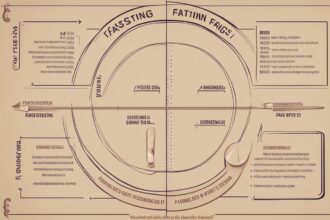Hey there, health enthusiasts! If you’ve ever wondered whether health fasting or traditional dieting is the better path to achieving your wellness goals, you’re not alone. Both approaches have their passionate advocates, promising weight loss, improved energy, and better overall health. But how do they stack up against each other? In this deep dive, we’ll unpack the science, benefits, and challenges of fasting versus dieting, helping you make an informed choice. Whether you’re curious about intermittent fasting benefits or the structure of a calorie-restricted diet, I’ve got you covered with practical tips and evidence-based insights. Let’s explore what works best for sustainable health!
What Is Health Fasting, and How Does It Work?
When we talk about health fasting, we’re referring to a practice of voluntarily abstaining from food and sometimes drink for a specific period. Unlike starvation, fasting is intentional and often tied to health or spiritual goals. Popular methods include intermittent fasting (like the 16/8 method, where you fast for 16 hours and eat during an 8-hour window), alternate-day fasting, or prolonged fasts lasting 24–72 hours. The idea is to give your body a break from constant digestion, potentially triggering benefits like improved insulin sensitivity and cellular repair (Mattson et al., 2017).
Fasting works by shifting your body into a state called ketosis, where it burns fat for fuel instead of glucose from food. This metabolic switch can lead to weight loss and other health perks, but it’s not a one-size-fits-all solution. The key is to approach fasting mindfully, ensuring you’re still meeting nutritional needs during eating windows. For many, fasting for wellness isn’t just about shedding pounds—it’s about mental clarity and resetting unhealthy eating patterns.
What Is Dieting, and Why Is It So Popular?
Dieting, on the other hand, typically involves reducing calorie intake or altering food choices to achieve specific health or weight loss goals. Think of plans like the Mediterranean diet, keto, or good old-fashioned calorie counting. Dieting’s appeal lies in its structure—there are clear rules to follow, whether it’s cutting carbs or tracking macros. It’s been a go-to for decades because it promises control over what you eat and, theoretically, over your body’s response (Sacks et al., 2009).
However, not all diets are created equal. Some focus on healthy eating habits with balanced nutrition, while others push extreme restrictions that can backfire with cravings or nutrient deficiencies. Dieting often requires consistent willpower, which can be tough in a world full of tempting snacks. Still, for those who find a sustainable plan, it can be a powerful tool for long-term health.
Key Benefits of Health Fasting
So, why are so many people raving about health fasting? Let’s break down some of the science-backed benefits that make it a compelling choice for many. Research suggests fasting can do more than just help with weight loss—it might transform how your body functions at a cellular level.
- Weight Loss and Fat Burning: Fasting promotes fat loss by reducing insulin levels, allowing your body to tap into stored fat for energy (Anton et al., 2018).
- Improved Metabolic Health: Studies show intermittent fasting can enhance insulin sensitivity, potentially lowering the risk of type 2 diabetes (Horne et al., 2015).
- Cellular Repair: During fasting, your body initiates autophagy, a process where cells clean out damaged components, which may support longevity (Bagherniya et al., 2018).
- Mental Clarity: Many fasters report heightened focus during fasting periods, possibly due to stabilized blood sugar levels.
These intermittent fasting benefits are exciting, but they come with a caveat: fasting isn’t for everyone. It’s crucial to listen to your body and consult a healthcare provider if you have underlying conditions.
Key Benefits of Dieting
Dieting has its own set of advantages, especially for those who prefer a more gradual and structured approach to health. Unlike fasting, which can feel intense, dieting often integrates seamlessly into daily life. Here are some reasons why it remains a popular choice:
- Customizable Plans: Whether you’re vegan, gluten-free, or focused on heart health, there’s a diet tailored to your needs.
- Focus on Nutrition: Many diets, like the Mediterranean, emphasize whole foods, ensuring you get essential vitamins and minerals (Estruch et al., 2013).
- Sustainable Weight Management: Gradual calorie reduction can lead to steady weight loss without the hunger pangs of fasting.
- Behavioral Change: Dieting often teaches portion control and mindful eating, fostering long-term healthy eating habits.
That said, dieting’s success hinges on consistency and avoiding overly restrictive plans that lead to yo-yo weight fluctuations. Finding a balance is key to making it work.
Challenges and Risks: Fasting vs Dieting
Neither health fasting nor dieting is without its hurdles. Fasting can be tough, especially for beginners. Hunger, irritability, and fatigue are common during the adjustment period, and there’s a risk of overeating during eating windows if not done mindfully. For some, prolonged fasting may even lead to nutrient deficiencies or exacerbate conditions like eating disorders (Trepanowski et al., 2017). It’s also not recommended for pregnant women, children, or those with certain medical conditions without professional guidance.
Dieting, while less intense, often struggles with sustainability. Restrictive diets can trigger cravings, and the constant focus on food rules can feel mentally draining. Plus, many diets don’t address lifestyle factors like stress or sleep, which are just as crucial for health. The biggest pitfall? Weight regain—studies show many dieters regain lost weight within a year if they revert to old habits (Wing & Phelan, 2005).
So, whether you’re exploring fasting for wellness or a structured diet, be honest about your lifestyle and emotional relationship with food. Both approaches require commitment and self-awareness to avoid potential downsides.
Practical Tips to Choose Between Fasting and Dieting
Deciding between health fasting and dieting comes down to your goals, personality, and daily routine. I’ve been on both sides of this fence, and trust me, there’s no universal “right” answer. Here are some actionable tips to help you figure out which path aligns with your needs:
If you’re leaning toward fasting, start small with a 12/12 intermittent fasting schedule (12 hours fasting, 12 hours eating) before jumping into longer fasts. Stay hydrated—water, herbal tea, and black coffee are your friends during fasting windows. Break your fast with nutrient-dense foods like veggies, lean protein, and healthy fats to avoid blood sugar spikes. Most importantly, don’t push yourself too hard; if you feel dizzy or unwell, stop and reassess.
For dieting, pick a plan that doesn’t feel like punishment. Focus on whole, unprocessed foods and aim for a slight calorie deficit if weight loss is your goal. Track your progress, but don’t obsess over the scale—energy levels and mood are just as important. And remember, slip-ups happen; don’t let one bad day derail your efforts.
Ultimately, blending elements of both can work wonders. Some folks pair intermittent fasting with a balanced diet during eating windows for a hybrid approach. Experiment, listen to your body, and seek advice from a nutritionist if you’re unsure. Your journey to healthy eating habits should feel empowering, not exhausting.
At the end of the day, whether you choose health fasting or dieting, the goal is sustainable wellness. Both can be powerful tools if approached with intention and care. Fasting offers unique benefits like metabolic flexibility and cellular repair, while dieting provides structure and nutritional focus. The trick is to personalize your choice—consider your lifestyle, health conditions, and long-term goals. Remember, there’s no magic bullet for health; it’s about consistency, balance, and tuning into what your body needs. So, are you ready to try fasting for wellness or craft a diet that fits your life? Take that first step, and let’s build a healthier you together!
References
- Anton, S. D., Moehl, K., Donahoo, W. T., et al. (2018). Flipping the metabolic switch: Understanding and applying the health benefits of fasting. Obesity, 26(2), 254–268. https://doi.org/10.1002/oby.22065
- Bagherniya, M., Butler, A. E., Barreto, G. E., & Sahebkar, A. (2018). The effect of fasting or calorie restriction on autophagy induction: A review of the literature. Ageing Research Reviews, 47, 183–197. https://doi.org/10.1016/j.arr.2018.08.004
- Estruch, R., Ros, E., Salas-Salvadó, J., et al. (2013). Primary prevention of cardiovascular disease with a Mediterranean diet. New England Journal of Medicine, 368(14), 1279–1290. https://doi.org/10.1056/NEJMoa1200303
- Horne, B. D., Muhlestein, J. B., & Anderson, J. L. (2015). Health effects of intermittent fasting: Hormesis or harm? A systematic review. American Journal of Clinical Nutrition, 102(2), 464–470. https://doi.org/10.3945/ajcn.115.109553
- Ageing Research Reviews, 39, 46–58. https://doi.org/10.1016/j.arr.2016.10.005
- Sacks, F. M., Bray, G. A., Carey, V. J., et al. (2009). Comparison of weight-loss diets with different compositions of fat, protein, and carbohydrates. New England Journal of Medicine, 360(9), 859–873. https://doi.org/10.1056/NEJMoa0804748
- Trepanowski, J. F., Kroeger, C. M., Barnosky, A., et al. (2017). Effect of alternate-day fasting on weight loss, weight maintenance, and cardioprotection among metabolically healthy obese adults: A randomized clinical trial. JAMA Internal Medicine, 177(7), 930–938. https://doi.org/10.1001/jamainternmed.2017.0936
- Wing, R. R., & Phelan, S. (2005). Long-term weight loss maintenance. American Journal of Clinical Nutrition, 82(1), 222S–225S. https://doi.org/10.1093/ajcn/82.1.222S






